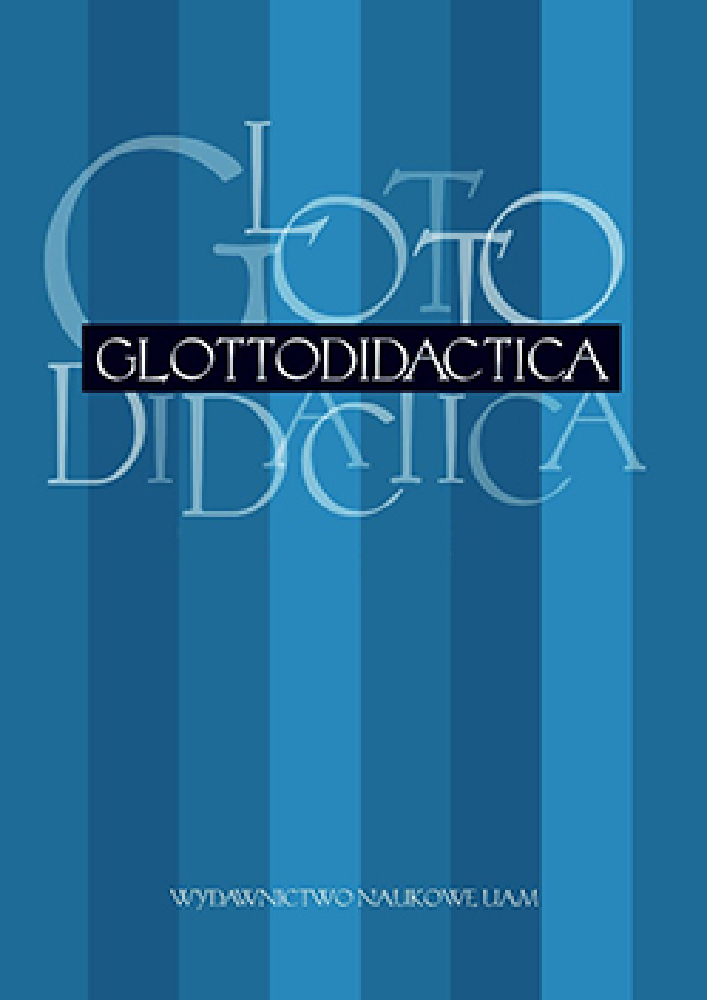Abstract
Optimizing Certificate German (ZD) Test Preparation with Regard to Task Form Placement and progress tests are used to provide optimum instruction. Experience with test task forms at various times in various situations increase task related skills and reduce test anxiety – closed tasks exercising recognition; open tasks production. Very important are skills in comprehending test task instructions and carrying them out. As an alternative to the more stressful schoolroom work, E-tests and CD-ROM work facilitate and stimulate preparation so long as the desired goals are kept in the forefront.References
Bausch, K.-R./Königs, F.G., 1985. (Er)Werben und (Er)Lernen. Eine Antwort auf zwei Antworten. In: Die neueren Sprachen, 84, 218-233.
Bausch, K.-R./Krumm, H.-J. (Hrsg.), 1995. „Sprachlehrforschung". In: Bausch, K.-R./Christ, H. /Krumm, H.-J. (Hrsg.), Handbuch Fremdsprachenunterricht. Tübingen und Basel: Francke Verlag: 7-12.
Bolton, S., 1996. Probleme der Leistungsmessung. Lemfortschrittstests in der Grundstufe. Femstudieneinheit 10. Berlin u.a.: Langenscheidt.
Chudak, S., 2007. Lernerautonomie fördernde Inhalte in ausgewählten Lehrwerken DaF fü r Erwachsene. Frankfurt am Main: Peter Lang.
Ciepielewska, L., 2002. „Die Bedeutung der Lehrwerkanalyse für den modernen Fremdsprachenunterricht". In: Glottodidactica. Volume XXVII. Poznań: Wydawnictwo Naukowe UAM, 65-67.
Council of Europe, 1997. European language portfolio: proposals fo r development. Strasbourg: Council of Europe.
Dietrich, I./Gäßler, R./Schilder, H., 1983. Der Fremdsprachenunterricht auf dem Wege der Schülerorientierung. In: Die Neueren Sprachen 82/3. (1983), 227-239.
Dłużniewski, S., 1992. Testy i zadania egzaminacyjne z języka niemieckiego. Warszawa: PWN.
Doyć, P., 1988. Typologie der Testaufgaben fü r den Unterricht Deutsch als Fremdsprache. Berlin u.a.: Langenscheidt.
Doye, P., 1995. „Funktionen und Formen der Leistungsmessung". In: Bausch, K.-R./Christ, H./Krumm, H.-J. (Hrsg.), Handbuch Fremdsprachenunterricht. Tübingen und Basel: Francke Verlag: 277-282.
Europarat. Rat für kulturelle Zusammenarbeit (Hrsg.), 2001. Gemeinsamer europäischer Referenzrahmen für Sprachen: lernen, lehren, beurteilen. Berlin: Goethe-Institut Inter Nationes u.a. Hrsg.).
Kast, B., 1996. Fertigkeit Schreiben. Fernstudieneinheit 12. Berlin/München: Langenscheidt.
Komorowska, H., 1974. Testy w nauczaniu języków obcych. Warszawa: Wydawnictwo Szkolne i Pedagogiczne.
Komorowska, H., 2007. Sprawdzanie umiejętności w nauce języka obcego. Kontrola - Ocena - Testowanie. Warszawa: Fraszka Edukacyjna.
Lienert, G.A., Raatz, U., 1994. Testaufbau und Testanalyse. Weinheim: Beltz, Psychologie Verlags Union.
Macht, K., 1995. Leistungsmessung und Curriculum. In: Bausch, K.-R./Christ, H./Krumm, H.-J. (Hrsg.), Handbuch Fremdsprachenunterricht. Tübingen und Basel: Francke Verlag, 282-285.
Neuner, G., 1995. Die Erstellung von informellen Leistungstests („Schulaufgaben") mit Hilfe der Übungstypologie. In: Neuner, G./Krüger, M./Grewer, U. (Hrsg.), Übungstypologie zum kommunikativen Deutschunterricht. Berlin u.a.: Langenscheidt.
Sandig, U., 2002. „Aufgabentypen und Testverfahren zum Überprüfen der kommunikativen Kompetenz im Unterricht Deutsch als Fremdsprache". In: Krück, B.I Loeser, K. (2002) Innovationen im Fremdsprachenunterricht 2 Fremdsprachen als Arbeitssprachen. Frankfurt a.M. u.a.: Peter Lang, 175-195.
Schmidt, R., 1994. Tests und Prüfungen. In: Heinrichi, G./Riemer, C. (Hrsg.) (1994): Einführung in die Didaktik des Unterrichts Deutsch als Fremdsprache mit Videobeispielen. Band 2. Schneider Verlag Hohengehren GmbH, 353-395.
Skowronek, B., 1997. Methodologische Rekonstruktion giottodidaktischer Theorien. Poznań: Wydawnictwo Naukowe UAM.
Vollmer, H.J., 1995. Leistungsmessung: Überblick. In: Bausch, K.-R./Christ, H./Krumm, H.-J. (Hrsg.), Handbuch Fremdsprachenunterricht". Tübingen und Basel: Francke Verlag, 273-277.
Vollmer, H.J., 2003. Leistungsmessung, Lernkontrolle und Selbstkontrolle. In: Bausch, K-R./Christ, H./Krumm, H.-J. (Hrsg.), Handbuch Fremdsprachenunterricht. Tübingen und Basel: Francke Verlag, 365-370.
License
Authors
Authors of texts accepted for publication in Glottodidactica are required to complete, sign and return to the Editorial team’s office the Agreement for granting a royalty-free license to works with a commitment to grant a CC sub-license.
Under the agreement, the authors of the texts published in Glottodidactica grant Adam Mickiewicz University in Poznań a non-exclusive, royalty-free license and authorize the use of Attribution-NoDerivatives 4.0 International (CC BY-ND 4.0) Creative Commons sub-license.
The authors retain the right to the free disposal of the work.
Users
Interested Internet users are entitled to use works that have been published in Glottodidactica since 2016, under the following conditions:
▪ attribution – obligation to provide, together with the distributed work, information about the authorship, title, source (link to the original work, DOI) and the license itself.
▪ no derivatives – the work must be preserved in its original form. Without the author's consent, it is not possible to distribute the modified work in the form of translations, publications, etc.
Copyrights are reserved for all texts published before 2016.
Miscellaneous
Adam Mickiewicz University in Poznań retains the property right as a whole (layout, graphic form, title, cover design, logo etc.).
Privacy statement
The names and email addresses published on this journal site will be used exclusively for the purposes declared by this journal and cannot be used for any other purpose or by any other party.




